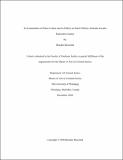An Examination of Police Culture and its Effects on Patrol Officers Attitudes towards Restorative Justice
Metadata
Show full item recordAuthor
Broschuk, Braeden
Date
2020-12-12Citation
Broschuk, Braeden. An Examination of Police Culture and its Effects on Patrol Officers Attitudes towards Restorative Justice; A thesis submitted to the Faculty of Graduate Studies in partial fulfillment of the requirements for the Master of Arts in Criminal Justice, Department of Criminal Justice. Winnipeg, Manitoba, Canada: The University of Winnipeg, December 2020. DOI: 10.36939/ir.202012141250.
Abstract
The purpose of this research is to examine the relationship between restorative justice and police culture, and the level to which this culture acts as barrier to the successful implementation and use of restorative justice by frontline police officers. Using a multi-level work group framework, frontline officer’s attitudes and understanding of restorative justice and police culture beliefs are examined, and then their impact on frontline police work is assessed. This study employs an explanatory sequential mixed methods design and is conducted in two phases. The initial quantitative phase involved distributing a Likert-style survey to frontline officers to measure their attitudes and understanding of restorative justice and police culture variables. After analysis of the initial quantitative findings, semi-structured interview questions were developed building on these findings to provide for a more in-depth qualitative analysis. Results indicate that police culture variables such as solidarity, teamwork, crime fighting and tough on crime attitudes are still persistent in policing, but frontline officers are generally accepting of restorative justice, and believe that it has a place in their frontline work as a dispositional tool. Findings indicate, however, that officers perceive restorative justice as another option only for less serious crimes and low risk offenders, and not as a new method of managing offender activity. Restorative justice is not being used to its fullest potential. To increase use of RJ diversion more thorough training, specialist designations and supervisory and middle management direction is recommended.

